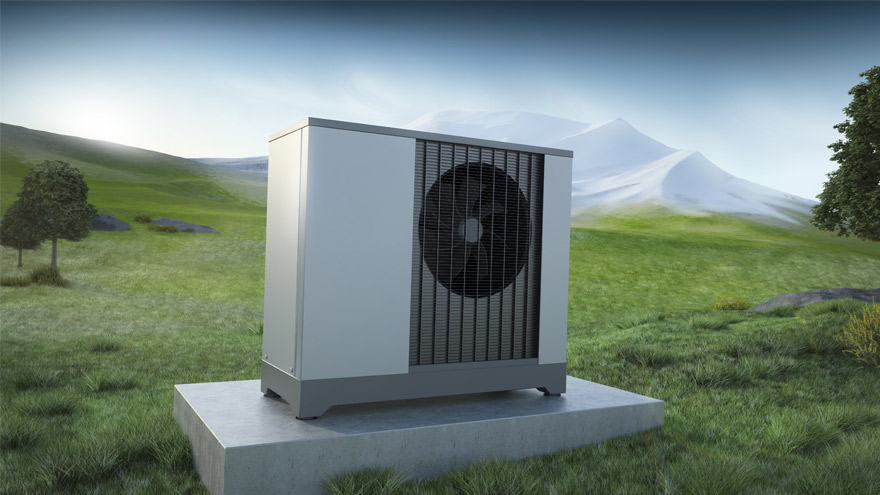Heat pumps are one of the most economical and environmentally friendly ways of heating buildings. Various types of these modern devices are available on the market, so every investor can choose a solution perfectly suited to their requirements. Ground and air heat pumps are the most popular. How do they differ from each other and which one is better to choose?

From this article you will learn:
- how air and ground heat pumps work,
- what are the advantages of a ground heat pump and an air one,
- When is it better to choose an air or ground heat pump?
How does a heat pump work?
A heat pump is a device that draws energy from a renewable source (air, ground or water) and uses electricity to transfer it to the heating installation in the building. It can be used both for heating rooms and preparing domestic hot water.
As the share of electricity in the heat production process is relatively small (approx. 20 - 25%), heat pumps are considered a very economical and environmentally friendly solution. Investors increasingly decide to install them because these devices:
- do not require fuel storage,
- they do not generate exhaust gases (which allows the chimney to be omitted at the construction stage),
- they do not need regular maintenance (e.g. removing ash, cleaning, etc.),
- they allow for a significant reduction in heating bills (the electricity needed to power them can be obtained, for example, from a photovoltaic installation),
- cooperate with other heat sources (such as underfloor heating),
- they are easy to use.
A heat pump may also offer additional benefits unique to its specific type. That's why below we'll take a closer look at the advantages and disadvantages of air and ground heat pumps.
Check out Wolf heat pumps at the Onninen wholesaler
Air heat pumps – advantages and disadvantages
An air heat pump draws energy from the air around the building. The higher its temperature, the less electricity is needed to process it. Therefore, this device works best in relatively stable weather conditions, and its efficiency drops significantly, for example during severe frosts.
Air pumps come in two basic variants:
- Air-to-air heat pump – collects heat from the surroundings and transfers it to the indoor (supply) unit, which directly heats the building. It can also be used to cool rooms.
- Air-water heat pump - also collects heat from the outside air, but via the installation transfers it to the upper source, i.e. the heating installation in the building (radiators, underfloor heating, domestic hot water system). It can cool rooms in summer.
 One of the most important advantages of air heat pumps are relatively low investment costs. Both the purchase of the device and its installation are incomparably cheaper than in the case of ground pumps. Moreover, the installation process is quick and easy, and the interference with the house and plot is minimal. Thanks to this, air heat pumps have a very wide range of applications and can be used on any plot, regardless of its specificity.
One of the most important advantages of air heat pumps are relatively low investment costs. Both the purchase of the device and its installation are incomparably cheaper than in the case of ground pumps. Moreover, the installation process is quick and easy, and the interference with the house and plot is minimal. Thanks to this, air heat pumps have a very wide range of applications and can be used on any plot, regardless of its specificity.
However, we should not forget about the disadvantages of air heat pumps, which include, above all, large fluctuations in their efficiency. This depends directly on the temperature difference between the lower and upper sources. This means that in winter - especially in larger buildings - the air heat pump will not be able to heat the house and water on its own. It will require support in the form of an additional heating system.
Wolf heat pumps
Ground heat pump – advantages and disadvantages
Ground heat pumps draw energy from underground. As the ground temperature is much more stable, their effectiveness is not so dependent on current weather conditions. Therefore, they are characterized by high and constant efficiency as well as low operating costs.
Due to the method of installation, ground source heat pumps are distinguished on the market:
- with a vertical collector – installed at a depth of several dozen meters. This variant is characterized by higher efficiency and stability, but its installation is much more expensive,
- with a horizontal collector - installed at a depth of 1.5 - 2 m, but occupying up to several hundred square meters of space. Installation of this variant is cheaper, but the ground exposed to solar radiation and rainfall is characterized by greater temperature fluctuations.
As you can see, both types of ground heat pumps have their advantages and disadvantages, but undoubtedly the more advantageous solution is to install a vertical collector. It takes up less space on the plot, draws energy from an environment with a stable temperature and conducts heat better than a horizontal collector. Unfortunately, the costs of such an investment may turn out to be unattainable for many people. It is therefore worth encouraging them to use various subsidy programs for renewable energy sources.
A plot that is too small may also be a hindrance factor for investors. Ground pumps are intended only for owners of large areas who are just planning a heating system in a newly constructed building. Installing the exchanger requires significant interference with the surroundings. It takes the form of expensive drilling (vertical collector) or extensive excavations (horizontal collector).
Exchange benefits in the new OnnTop loyalty platform!
Air or ground heat pump – which one to choose?
Knowing the advantages and disadvantages of both types of heat pumps, it can be said with certainty that there is no universal solution that will work in every case. The selection of such a device should depend on both the investor's needs and its capabilities. We are talking mainly about parameters such as:
- building size,
- land area,
- available budget,
- climatic conditions,
- individual preferences regarding heat demand,
- possible cooperation with another heat source.
To sum up, one may be tempted to conclude that ground pumps are intended for the most demanding investors who have a sufficiently high budget and a sufficiently large plot of land. Importantly, such a solution should be decided at the construction stage!
In the case of air heat pumps, the requirements are not so stringent. This type of device can be installed on any plot, but you must remember to support it with an additional heating system. It will be indispensable in buildings with a large area, where the installation is to provide not only heating of the house, but also preparation of domestic hot water.

You will find air and ground heat pumps in Onninen!
When looking for ideal solutions for your customers, take a look at the Wolf brand range, available in our online wholesaler. You will find both air and ground heat pumps here. The available devices include the following models:
- split air pump 9.6 kW, without electric heater ,
- split air-water pump 9.6 kW, with electric heater ,
- monoblock air-water pump 10 kW, for indoor installation ,
- ground heat pump, brine-water 6 kW .
As you can see, in Wolf's offer you will easily find heat pumps perfectly tailored to the needs of your customers!